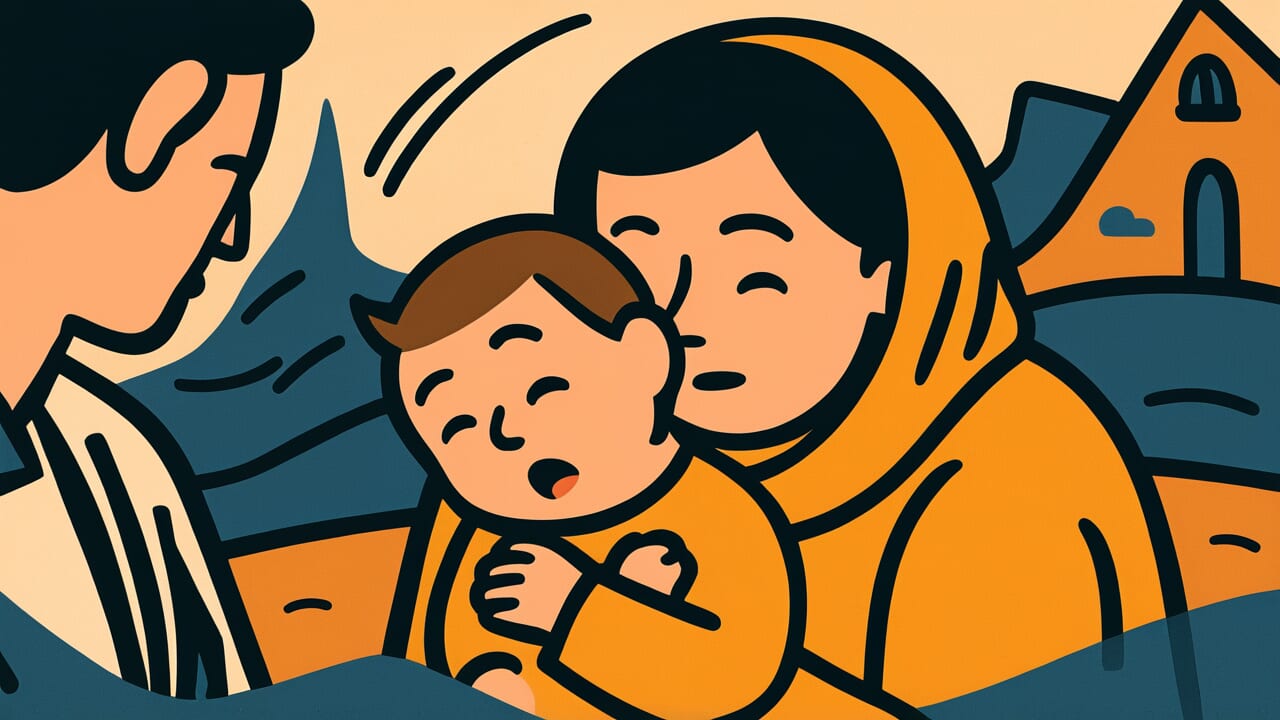How to Read “If you have a child, you will cry seventy-five times”
Ko wo moteba nanajūgo-do naku
Meaning of “If you have a child, you will cry seventy-five times”
This proverb honestly expresses the reality of parenthood. When you have a child, you will cry many times from various worries and hardships.
From the moment a child is born, parents face countless anxieties and concerns alongside their joy. During infancy, there are night crying episodes and illnesses to worry about.
In early childhood, parents fear accidents. During school years, they worry about friendships and academic performance. In adolescence, they face rebellion and career decisions.
Even after children become adults, parents worry about employment and marriage. A parent’s concerns never truly end.
People use this proverb to acknowledge the harsh realities of parenting, not just its idealized beauty. It serves as mental preparation for those about to become parents.
Parents raising children also use it to understand each other’s struggles. Today, the difficulties of child-rearing remain unchanged. In fact, with increased focus on education and safety, parental worries may have grown.
Yet this saying also contains deep affection. It implies that “even so, parents continue to love their children.”
Origin and Etymology
The exact source of this proverb is unclear. However, the specific number “seventy-five” reveals an interesting background.
In traditional Japanese number usage, “seven” and “five” symbolize completeness and abundance. Expressions like “fall down seven times, get up eight” and “five organs and six bowels” use numbers symbolically.
They don’t indicate actual counts but mean “countless times.” The expression “seventy-five times” likely combines the auspicious numbers seven and five.
This was probably a clever way to impressively convey the many tears parents shed for their children. During the Edo period, such expressions using specific numbers likely emerged among common people discussing child-rearing struggles.
These phrases resonated with shared experiences. Back then, infant mortality rates were high. Disease, famine, and accidents gave parents far more occasions to cry over their children than today.
Still, this saying shows the resolve to accept both the joy and suffering of having children and to live as a parent. It simultaneously expresses numerical appeal and the depth of parental love.
This proverb reflects the Japanese sensitivity to language.
Usage Examples
- My daughter entered her rebellious phase, and I truly understand the saying “If you have a child, you will cry seventy-five times”
- I can’t sleep at night worrying about my son’s entrance exams, but “If you have a child, you will cry seventy-five times,” so this must be a parent’s duty
Universal Wisdom
This proverb has been passed down because it brilliantly captures the essence of becoming a parent. The moment humans have a child, they gain someone more precious than themselves.
At the same time, they carry anxieties they cannot control. This has been the unchanging fate of parents since humanity began.
What’s interesting is that this proverb uses “crying” as its emotional expression. It chose tears, a symbol of vulnerability, rather than joy or pride.
This shows deep human understanding. Parents try to be strong, but they actually feel powerless before their children and suffer heartache many times.
That weakness is actually proof of parental love. Also, by using the specific number “seventy-five,” the proverb suggests that hardship isn’t temporary.
It continues as long as you’re a parent. Even as children grow, parental worries continue in different forms. However, this saying contains not resignation or pessimism, but rather resolve and acceptance.
The strength to not fear crying and still remain a parent. This may be one of humanity’s most beautiful contradictions.
Our ancestors knew that living with this contradiction is what makes us human.
When AI Hears This
Looking at the number 75 through probability theory reveals an interesting pattern. If human lifespan is 80 years and child-rearing spans 50 years, you cry 1.5 times per year.
That’s once every eight months. This is neither “crying every day” nor “rarely crying” but an exquisitely balanced frequency.
What’s noteworthy here is the “distribution of crying events” this proverb suggests. During infancy, parents cry frequently over illness and accident worries.
During school years, things calm down somewhat. In adolescence, concerns increase again. After adulthood, parents cry sporadically over marriage and grandchildren issues.
Viewing this variation as a mathematical model, it resembles a Poisson distribution. This describes “events that seem random but are actually predictable.”
For example, it has the same mathematical properties as intervals between raindrops hitting the ground or phone call frequencies.
What’s even more interesting is that 75 functions as an “expected value.” In reality, some people cry 50 times, others 100 times.
But on average, it converges around 75 times. This is wisdom that numerically quantified the standard emotional cost of “child-rearing as a probabilistic event” through experience.
Modern psychological research confirms that parents experience 1-2 major stress peaks annually. The accuracy of this proverb is surprising.
Lessons for Today
This proverb teaches us the truth that no perfect parent exists. Social media overflows with photos of happy families. Parenting books line up with ideal child-rearing methods.
But actual parenting is a continuous series of worries and anxieties. This isn’t because you’re a failed parent. It’s a natural emotion that comes from loving your child.
What matters is not being ashamed of crying. Worrying about your child, spending sleepless nights, and sometimes shedding tears. This isn’t weakness but a sign of your seriousness as a parent.
Crying seventy-five times also means you seriously thought about your child seventy-five times.
Modern society pressures us to “be positive.” Parents are often expected to be constantly bright and forward-looking. However, this proverb teaches us “it’s okay to cry.”
Worrying, agonizing, sometimes being crushed by feelings of powerlessness, yet still continuing to face your child. That accumulation is what real parenting is.
Your tears are proof of love. Don’t forget that.



Comments